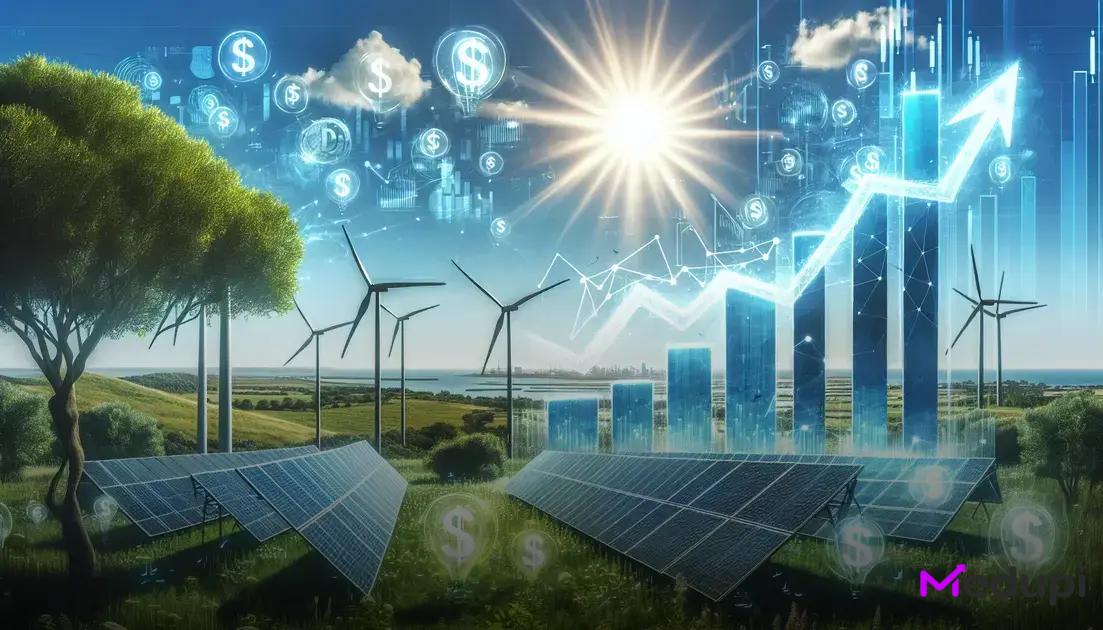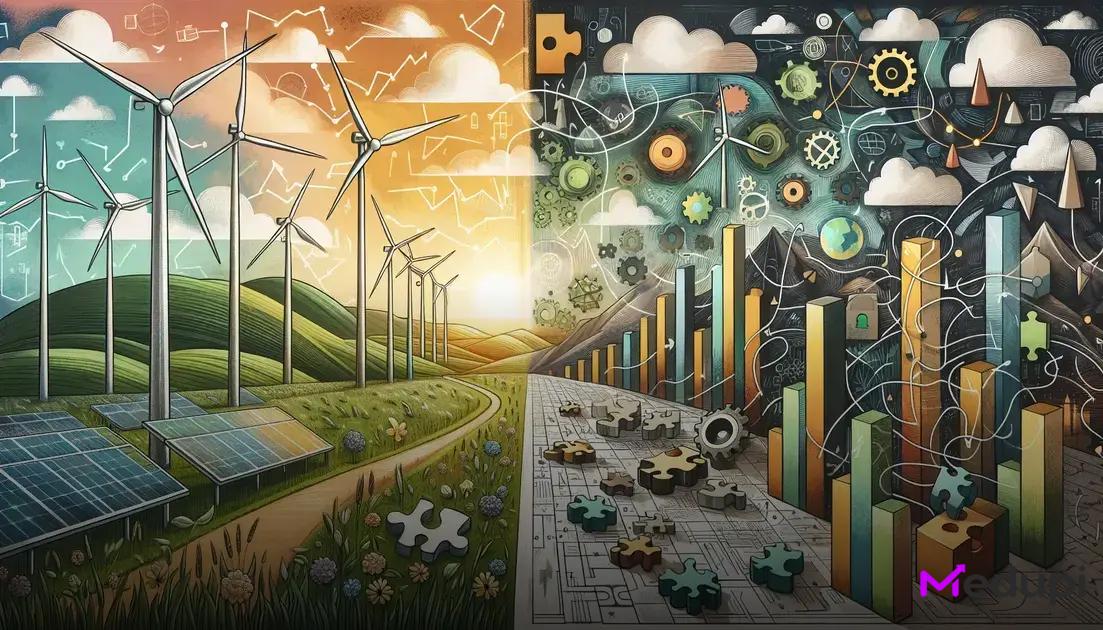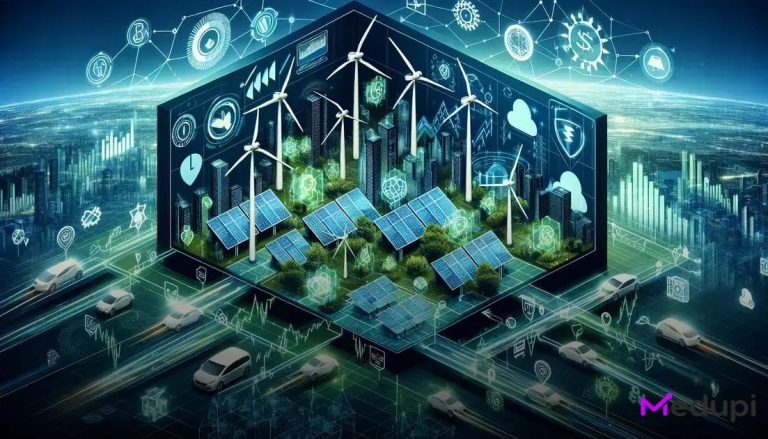ADVERTISEMENT
Renewable energy investments are booming as the world shifts towards sustainable and eco-friendly power sources. Understanding the trends and benefits of these investments can help you make informed decisions in 2024.
The growth of renewable energy investments
Investments in renewable energy have seen remarkable growth in recent years. This surge is driven by a combination of technological advancements and increasing global awareness of climate change. With many countries committing to reducing their carbon footprints, renewable energy sources such as wind, solar, and hydro are becoming more pivotal.
ADVERTISEMENT
In 2024, financial support from both governments and private sectors is anticipated to skyrocket. Legislation favourable to renewable investments and incentives like tax breaks are major contributors. Additionally, increasing demand for clean energy among consumers is pushing companies to make greener choices.
The ability of renewable energy to provide sustainable and long-term solutions is not only beneficial for the environment but also lucrative for investors. Investments are no longer just about corporate social responsibility, but also about leveraging economic opportunities stemming from an evolving energy sector.
ADVERTISEMENT
The growth trajectory is also boosted by innovations in energy storage. With better storage technologies, renewable energy becomes more reliable and capable of meeting continuous power demands, thus making it an increasingly viable investment option.
Key benefits of investing in renewable energy

Investing in renewable energy comes with numerous benefits that cater to both the investor and the environment. One significant advantage is the reduction in greenhouse gas emissions. By shifting towards renewable sources, such as wind, solar, and hydro, we significantly cut down the carbon footprint.
Another benefit lies in energy cost savings. Renewable energy sources, once installed, generally incur minimal operational costs compared to traditional fossil fuels. This translates to lower energy bills and a more stable energy market.
Job creation is also a key benefit associated with renewable energy investments. The renewable energy sector is labour-intensive, generating employment in areas such as manufacturing, installation, and maintenance.
Investing in renewable energy also provides energy security and independence. By diversifying the energy supply and relying on domestic sources, countries can reduce their dependency on imported fuels, ensuring a more resilient energy infrastructure.
Lastly, renewable energy investments contribute to long-term sustainability and resilience. Renewable sources are inexhaustible, unlike fossil fuels, which are finite and subject to depletion. By leveraging these sustainable resources, we can meet current energy demands without compromising the ability of future generations to meet theirs.
Top trends in renewable energy for 2024
The renewable energy sector has been experiencing remarkable growth, and several trends are shaping its landscape in 2023. Among the most notable trends is the increasing adoption of solar power. Technological advancements have made solar panels more efficient and affordable. This accessibility is driving widespread use, from residential rooftops to large-scale solar farms.
Another crucial trend is the integration of storage solutions. With the inconsistency of natural resources, energy storage systems like batteries are becoming essential. These technologies ensure that energy captured from renewable sources is available when needed, promoting a reliable energy supply.
Furthermore, the widespread use of wind energy continues to play a pivotal role. Offshore wind farms are particularly gaining traction due to their high energy potential and minimal land use. Innovations in turbine design are also contributing to more efficient energy capture.
Additionally, green hydrogen is emerging as a significant player. Produced through renewable resources, green hydrogen offers a sustainable alternative for industries traditionally reliant on fossil fuels. It’s versatility for various applications positions it as a key component in the future energy mix.
Moreover, there is a growing trend towards digitalisation and smart grids. The use of AI and IoT in energy management allows for better demand prediction, efficient energy distribution, and improved grid stability. These technologies are crucial for managing the complex dynamics of renewable energy integration.
Finally, the emphasis on sustainability and eco-friendly practices is stronger than ever. Investment in renewable energy is not just an economic decision but also a commitment to reducing carbon footprints and combating climate change. This trend is evidenced by increasing regulatory support and corporate sustainability initiatives worldwide.
Challenges in renewable energy investments

Investing in renewable energy presents several challenges due to the evolving nature of the technology and market dynamics. One of the primary obstacles is the high initial capital costs associated with setting up renewable energy infrastructure like solar panels and wind turbines. These costs can deter potential investors looking for quicker returns.
Another challenge is the intermittency of renewable energy sources. Solar and wind energy generation is dependent on weather conditions, which makes it less reliable than traditional energy sources. To mitigate this issue, significant investments are required in energy storage solutions and grid management technologies.
Regulatory hurdles also pose a significant barrier. Renewable energy investments often require navigating complex regulatory frameworks and acquiring various permits. These can vary significantly between regions, adding another layer of complexity for investors.
Additionally, there is a shortage of skilled workforce to support the burgeoning renewable energy sector. Training and development programs are essential to equip workers with the necessary skills to install, maintain, and operate renewable energy systems efficiently.
The long payback period is another considerable challenge. Renewable energy projects typically offer steady but long-term returns, which might not be attractive to investors seeking quick profits. Educating investors on the long-term benefits and stability of renewable energy investments is crucial to overcoming this perception.
Finally, the uncertainty in government policies and subsidies can make investment in renewable energy risky. Policy changes or the removal of subsidies can significantly impact the financial viability of projects. Ensuring a stable and supportive policy environment is essential for fostering investment in renewable energy.
Future outlook for renewable energy investments
The renewable energy sector is poised for significant growth in the coming years. With increasing awareness about climate change, more investments are being funnelled into sustainable energy solutions. Advancements in technology and lower costs are making renewable energy more accessible and attractive to investors.
Additionally, global policies are increasingly favouring green energy initiatives. Governments around the world are setting ambitious targets to reduce carbon emissions, which is expected to further drive investments in renewable energy projects. The private sector is also playing a crucial role, with many corporations committing to 100% renewable energy usage in the near future.
More innovative financing options are emerging, making it easier for investors to enter the market. This includes green bonds and other sustainability-linked financial products. The rise of renewable energy storage solutions like advanced batteries is also expected to enhance the reliability and effectiveness of renewable energy systems.
There is a growing emphasis on research and development to improve renewable energy technologies and make them more efficient. This continuous innovation is crucial for overcoming existing challenges and ensuring the long-term viability of renewable energy sources.





